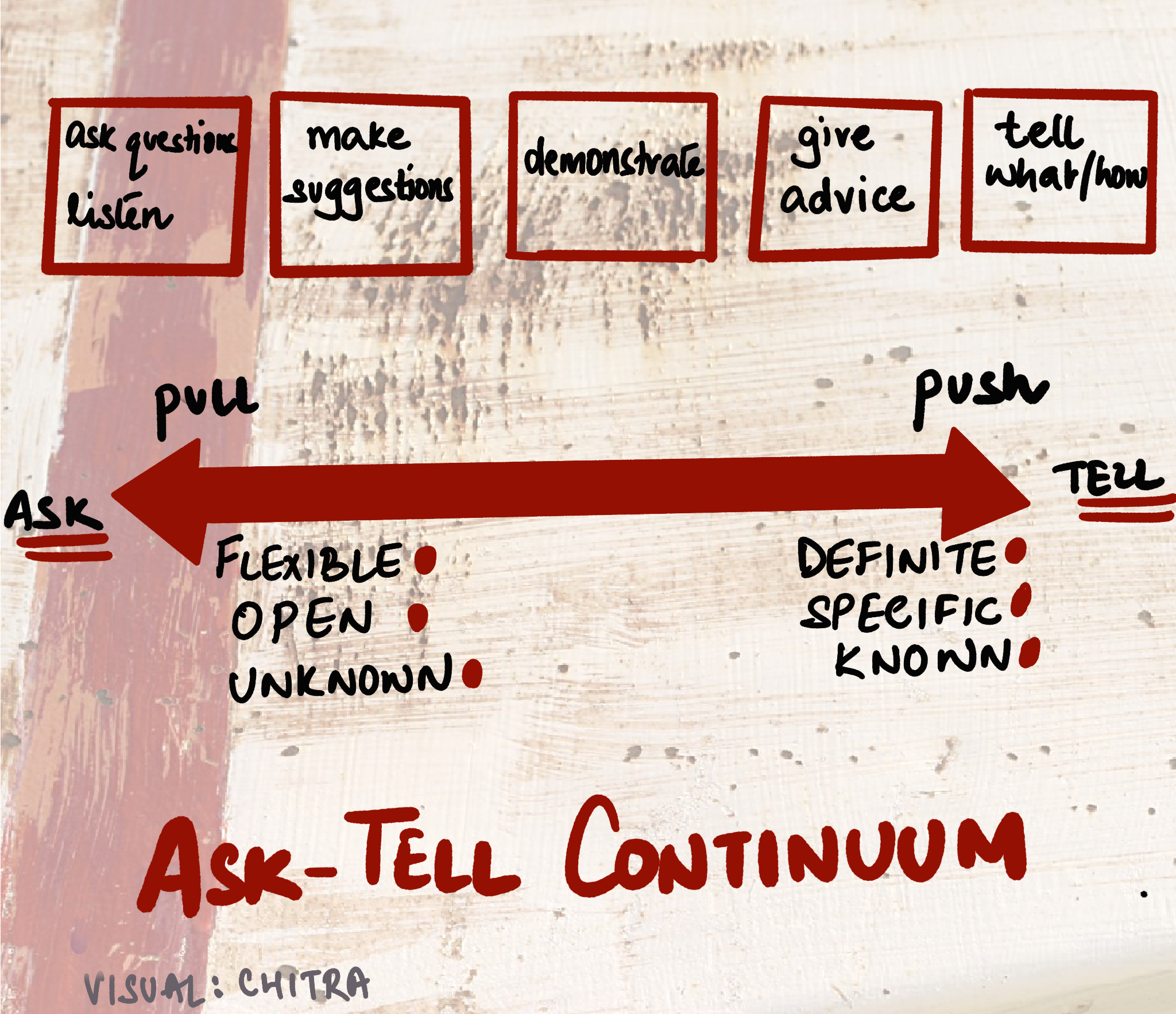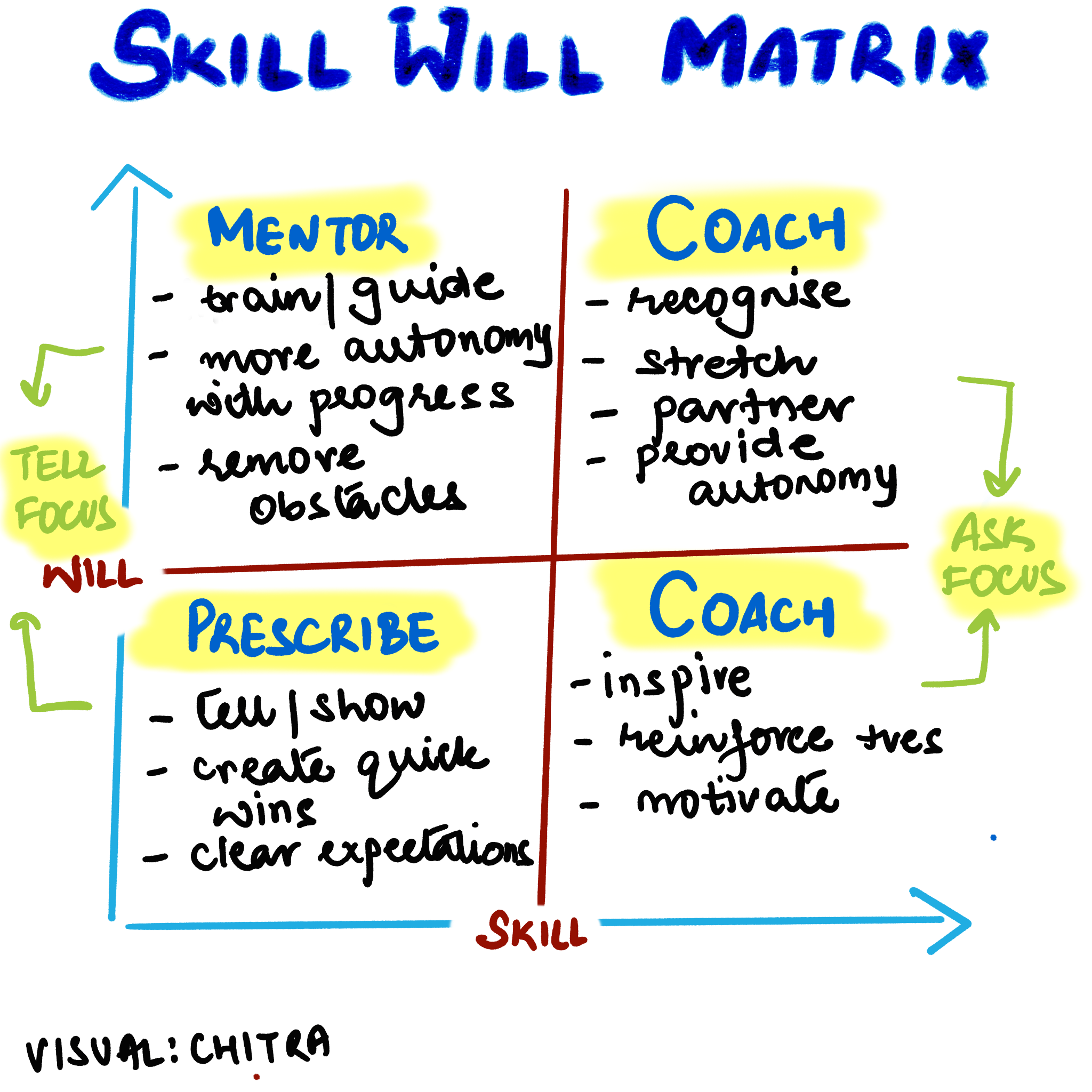Difference between coaching & mentoring
Key differences between coaching & mentoring based on the ask tell continuum.

Aruna sat across from me, looking like she was doing all she could to not throw her rather heavy looking ipad at me! We'd just had an hour long conversation where we had surfaced some significant disabling beliefs for her as a program manager. According to me this was a great outcome - if she saw her challenges in a new empowering way, she could grow really fast! So I was puzzled at her apparent frustration, while being thankful for her self control!
"What's wrong?" I asked.
"Well....you know I really appreciate your spending time and energy with me. And I do see the value in these deep conversations we have. It's just that right now I'm drowning! This role & this space are both new to me and I have so much newness & chaos to deal with everyday. I wish you would just tell me what to do rather than asking me so many questions about I think or want. That's valuable, but right this moment I need someone who's been-there-done-that to tell me how to do stuff around here!"
Aruna was new to the company and she was handling a complex program. She was bright & was doing quite well, so I assumed that we should focus on her long term career growth in her conversations. I was trying to coach her, while what she needed was a mentor. So I took a huge helping of humble pie that day and realised that I had to be more intentional about how I was engaging in guiding conversations with my team members.
As a cultivator, you will often find yourself in guiding conversations with your team members, mentees or coachees. These conversations can vary in nature depending on the context and you are likely to traverse between various ends of the Ask Tell Continuum. It's useful to clarify for yourself as well as for the person you are supporting, as to which hat you’re wearing at any given point in time. It can help you set the right role boundaries & be clear about who owns what part of the process. That way you can have clear expectations from each other and avoid the dysfunctions that come with assumptions & inaccurate expectations.
Coaching v/s Mentoring

At a high level, if you are coaching someone, you want to ask a lot of questions & help them come to a conclusion on their own. However, as a mentor you may tell someone exactly what to do & how to do it.
Broadly speaking-
a) Coaching is:
- long-term
- beyond craft skills
- can be formal or informal
- purely development-driven
- goals are decided by the coachee & the coach supports them
- largely non-directive
- emergent & directionally flexible - the agreed outcome can shift & change over time
b) Mentoring is:
- craft skills based
- short-term
- specific & measurable
- goals / plan are co-created by the mentor & mentee
- performance & learning driven
- directive to some degree
It typically requires the mentor to have expertise in the area they are mentoring in.
As a cultivator, you may find that you play different roles with the same person depending on the context. For example when you're trying to help your team member articulate their career aspirations, you're likely to be effective if you wear the coaching hat. You ask a lot of good questions to help them unearth their own desires and inclinations. You help them surface their fundamental values & help them reflect whether their aspirations are aligned with them. But if you're trying to help the same person get better at creating user journeys, you are likely to wear a mentoring hat. You may give them a list of resources to learn from or directly show them how it's done.
When to mentor & when to coach?
It depends! As a team lead, you will need to employ both styles depending on what your team members need. As a coach or mentor, you may need to do the same. There is hardly any coaching or mentoring relationship that stays tightly within the boundary of the definitions of these roles.
A useful model to decide where on the continuum you should be in a cultivation relationship or conversation is the skill-will matrix. The skill-will matrix is derived from the situational leadership theory created by Paul Hersey and Ken Blanchard in the 1970s. Will stands for the involvement & willingness of the team member to learn / progress. Skill, as the name suggests, refers to the team member's skills.

What skills should you pay attention to?
You are likely to have a natural style & preference on the ask-tell continuum by default. You may naturally be more comfortable sharing advice or teaching a craft. Conversely you may be more comfortable with helping others discover or unearth what they already know but hadn't articulated. However, it's useful to develop skills required for both mentoring & coaching, especially if you hold a leadership role.
There is significant overlap between the skills needed to play both roles but there are clear differences as well. Skills such as building trust, listening, giving effective feedback, asking good questions & creating psychological safety are common to both roles. However coaching requires additional skills such as recognising deeply held mental models, unlocking limiting beliefs, perspective shifting & appreciative inquiry. It also demands deeper self awareness & a strong sense of ethics in the relationship. Mentoring on the other hand requires that you develop a deeper understanding of how adults learn new skills and how to teach / prescribe with clarity & patience.
It's incredibly valuable for leaders to invest time & energy in learning both coaching & mentoring skills. They are both key to building a thriving culture of cultivation.
Cover Image Credit: Joel Filipe on Unsplash




